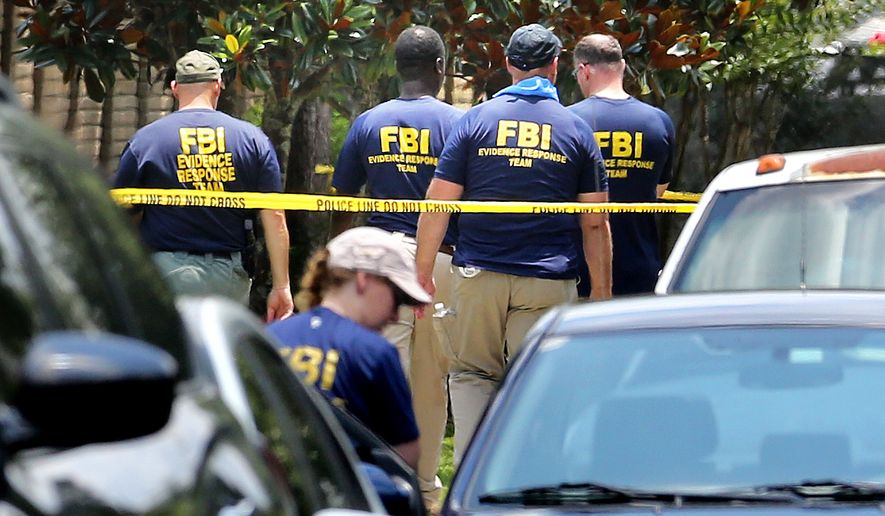OPINION:
The Orlando massacre by a homegrown American Muslim who wanted to die a martyr for al Qaeda raises a host of deeply disturbing questions about keeping America safe.
How is it that the killer, who was placed on a terrorist watch list, could undergo lengthy FBI investigations that wrongly concluded he was not a threat to anyone?
How is it that Omar Mateen, who told co-workers about his connections to terrorist groups like al Qaeda, was able to walk into a gun store and purchase firearms he used to kill at least 49 innocent people?
It was the third time since the 2013 Boston Marathon bombing that the FBI had investigated suspects who later perpetrated a terrorist attack.
In the case of the Orlando shooter, Mateen was under FBI surveillance when he was subjected to two separate investigations in 2013 and 2014. A year-and-a-half later he left a trail of carnage in a gay nightclub.
There is clearly something wrong with the FBI’s rules of procedure that allowed this to happen. And something is deeply wrong with our gun dealer background checks that are required by law.
Was Mateen’s name put on the “no fly” list? FBI Director James B. Comey declined to answer that question.
Even if the FBI comes up empty-handed and has closed the case on a terrorist suspect, shouldn’t that be recorded and automatically pop up on some gun check list?
According to the gun dealer at the St. Lucie Shooting Center who sold him two firearms, Mateen passed a full background check.
The reason: the FBI found nothing in his background that would have put him on that list, Mr. Comey said.
Hasn’t this happened enough times in past years to at least suggest that in certain troubling cases, investigations should remain open for a much longer period of time?
These are some of the questions that the FBI and the Congress will have to re-examine in the weeks and months to come.
The FBI is going to have to review everything in its two previous investigations of Mateen to determine if agents overlooked or ignored facts that warranted further inquiry.
No doubt, the House and Senate will hold investigative hearings into a whole range of issues raised by this tragic event. Is the FBI lacking resources and personnel do its job? Did the agency fail to follow up leads? Did they work closely with local law enforcement and provide them with relevant information about Mateen and his whereabouts?
“We are going to have to look hard at our own work to see whether there is something we should have done differently,” Mr. Comey told reporters Monday.
“So far, the honest answer is: I don’t think so,” he said.
A full-scale investigation by congressional oversight committees, that includes questioning officials from the top down, may come up with a different answer.
As of now, however, there is no evidence that Mateen had verifiable formal connections to major foreign terrorist networks like the Islamic State (ISIS). But he had become radicalized and pledged allegiance to the Islamic State and al Qaeda, and to their avowed plans to attack U.S. targets.
For now, anyway, he emerges as a lone gunman who had all the characteristics of a terrorist, and was prepared to die a martyr and kill as many Americans as he could.
The FBI told of one witness who said Mateen watched videos of the terrorist cleric, Anwar al-Awlaki, a leader of al Qaeda’s branch in Yemen.
Others who knew him said he was “full of hate” for Americans, and blamed everything that was wrong with his life on America. He got into trouble at school and was tossed out. His ex-wife told reporters that he abused her.
He became more radicalized and told co-workers he knew the two perpetrators in the Boston bombings. He claimed members of his family were al Qaeda supporters. They passed on his claims to the local sheriff’s office, and they in turn reported him to the FBI.
But in the end, the FBI investigations turned up nothing incriminating and eventually, the case was closed.
“As I would hope the American people would want, we don’t keep people under investigation indefinitely,” Mr. Comey told reporters. “If we don’t see predication for continuing it, then we close it.”
But that poses this question: Why not keep the case open? Why not ask his co-workers and acquaintances to keep them posted about his activities? Why not alert gun dealers in the area to contact the agency if he comes in to buy firearms and large amounts of ammunition?
We are in a war with Islamic-based terrorists who have placed no deadlines on their crusade to kill as many of us as they can. They think long-term, decades and maybe centuries.
The United States and the FBI cannot afford to place time limits on their task to keep us safe from these murderers. If their investigation into Mateen’s activities had remained open, it’s very possible the Orlando night club massacre could have been prevented.
Maybe it’s time for Congress to begin thinking outside the box — and that our existing law enforcement agencies are not up to the enormity of the task before us.
The FBI has long been our nation’s chief investigative force, catching criminals and other evildoers, and often foiling deadly plots before they occur.
But the war on terrorism may require a wholly new and well-equipped agency that is solely focused on this rapidly growing threat to America’s security.
This reevaluation has to be one of Congress’ chief priorities in the months to come if we are to prevent even worse atrocities from happening in our homeland.
• Donald Lambro is a syndicated columnist and contributor to The Washington Times.




Please read our comment policy before commenting.